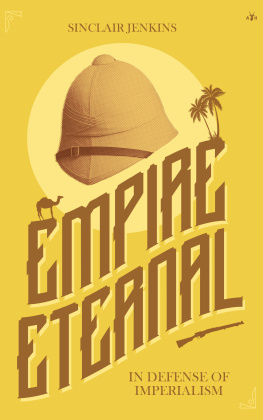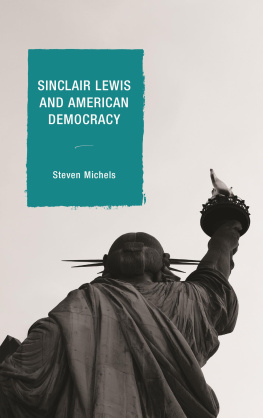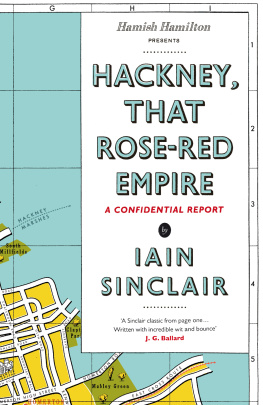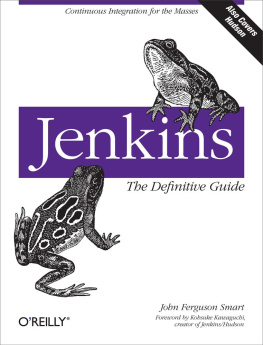Sinclair Jenkins - Empire Eternal
Here you can read online Sinclair Jenkins - Empire Eternal full text of the book (entire story) in english for free. Download pdf and epub, get meaning, cover and reviews about this ebook. year: 2021, publisher: Antelope Hill Publishing, genre: History. Description of the work, (preface) as well as reviews are available. Best literature library LitArk.com created for fans of good reading and offers a wide selection of genres:
Romance novel
Science fiction
Adventure
Detective
Science
History
Home and family
Prose
Art
Politics
Computer
Non-fiction
Religion
Business
Children
Humor
Choose a favorite category and find really read worthwhile books. Enjoy immersion in the world of imagination, feel the emotions of the characters or learn something new for yourself, make an fascinating discovery.
- Book:Empire Eternal
- Author:
- Publisher:Antelope Hill Publishing
- Genre:
- Year:2021
- Rating:3 / 5
- Favourites:Add to favourites
- Your mark:
- 60
- 1
- 2
- 3
- 4
- 5
Empire Eternal: summary, description and annotation
We offer to read an annotation, description, summary or preface (depends on what the author of the book "Empire Eternal" wrote himself). If you haven't found the necessary information about the book — write in the comments, we will try to find it.
Empire Eternal — read online for free the complete book (whole text) full work
Below is the text of the book, divided by pages. System saving the place of the last page read, allows you to conveniently read the book "Empire Eternal" online for free, without having to search again every time where you left off. Put a bookmark, and you can go to the page where you finished reading at any time.
Font size:
Interval:
Bookmark:
Empire Eternal: In Defense of Imperialism
Sinclair Jenkins
E MPIRE E TERNAL
In Defense of Imperialism
BY
S I N C L A I R J E N K I N S

Antelope Hill Publishing
Copyright 2021 Sinclair Jenkins
This work contains a collection of writings, many of which were originally published by the author on American Renaissance (amren.com). Publication dates have been specified for these writings where applicable. Some minor edits have been made from these original publications.
Publishers Note: Antelope Hill is proud to publish various and at times differing perspectives which contribute to understanding the history of the European people, building their political consciousness, or demonstrating the intellect of contemporary White writers and thinkers. The relationship between the White race as a collective life and the concept of imperialism has sometimes been tense, and the imperialist reach of European blood throughout the earth has proceeded from differing motivations, some more or less noble, some more or less beneficial for Whites themselves. Regardless of the greater circumstances, the stories in this book are moments in history that demonstrate the martial prowess and courage of European men of action.
Cover art by sswifty
Interior formatting by Margaret Bauer
The publisher can be contacted at
Antelopehillpublishing.com
Paperback ISBN-13: 978-1-953730-19-0
EPUB ISBN-13: 978-1-953730-22-0
Contents
Why imperialism? That question must be addressed. After all, for many on the right-wing of the spectrum, imperialism is the obvious enemy. American neoliberal imperialism has a stranglehold on the world, and every tendril of the monster oozes the grease of sexual depravity, homosexual and trans-sexual rights, minority privileges, and fawning adoration of the marketplace. If you care about European and American advocacy, then you would, in Anno Domini 2021, be an anti-imperialist or at least against the global leviathan of Washington, D.C.
First of all, the American nation and its founding stock would not exist if it were not for imperialism. Rather than the U.S. Constitution or even the Mayflower Compact, the true founding document of the American people is Richard Hakluyts A Discourse Concerning Western Planting (1584). In that work and other pamphlets, the English patriot Hakluyt laid bare the many reasons why London should establish colonies (or plantations) in the New World much as had already been done in Ireland. Hakluyt argued that:
The Queen of Englands title to all the West Indies, or at the least to as much as is from Florida to the Circle arctic, is more lawful and right than the Spaniards or any other Christian Princes.
That speedy planting in diverse fit places is most necessary upon these lucky western discoveries for fear of the danger of being prevented by other nations which have the like intentions, with the order thereof and other reasons therewithal alleged.
Hakluyt s propaganda found a receptive audience in Queen Elizabeth I as well as the poet-explorer-privateer Sir Walter Raleigh. Inspired by Hakluyts words, as well as the common English belief in the sheer barbarism of Spanish colonialism in the New World, Raleigh and his followers established the earliest English colonies in North America. These attempts would be succeeded by the permanent colonies in Virginia established by the Virginia Company of London. It is here, in the late 16th century, that the American spirit, with its Anglo roots, is first given expression in the mixture of idealism, adventure, and efficiency. In essence, the genus and germ of American nationalism is English imperialism.
There are t hose on the Dissident Right who articulate support for absolutist nationalism. Men like RAMZPAUL believe in nationalism for all races and peoples. Built into this belief system is the conceit that Euro-American identitarianism should only concern itself with the preservation of European homelands. This is a worthy cause. Indeed, in our age it is one of the few causes worth dying for. However, this brand of nationalist identitarianism is still a retreata philosophical surrender to forces of neoliberalism and Third World-ism. It is a surrender of the hands and a collective shout of: Just leave us alone!
The Left will never leave us alone. The Left is always hungry for more power. It is never satisfied. That is why fighting it is a necessity. Restoring imperialism is but one weapon to wield in this fight. However, this book seeks to show how it is the strongest, most proactive weapon.
Empire Eternal, which you hold in your hands now, is an attempt to show that the age of imperialism and colonialism was the apex of Euro-American civilization. My point in these essays, almost all of which are purely historical in nature and substance, is to reaffirm the glory of a European and American-led world order. In a similar way, this book seeks to argue that a return to imperialism would be a boon for Europeans and Americans, and indeed the rest of the world.
The stark truth facing us in the 21st century is that there are only two options: globalist hegemony led by China and Euro-American turncoats, or neo-imperialism led by nation-states. The former are akin to robber barons, who take and take without giving anything in return. The forces of global and neoliberal capital have no allegiance to the nation-state or their people, that is unless the nation-state in question is China (for more information on Chinas desire for revenge against the West, see The Chinese Uprising Against Whites). Imperialists at the very least mostly provided their fellow citizens with the benefits of other lands. If they did not, then the drive for conquest would not last. Imperial states are also beholden to national voters; the same cannot be said of transnational corporations. There will never be an age of harmonious cooperation. This goes against human nature, and it always irritates large and powerful civilizations, which are built for conquest and expansion. Imperialism generates pride, new opportunities, and incredible vitality. Globalism provides nothing of value except to the elite few who can reap its rewards.
There is no hate here. The only emotion is pride pride in Christendom, pride in our forefathers, and pride in the much maligned colonization system that gave the world the greatest creole civilizations ever known, from the Old South to the Viceroyalty of New Spain. The men who founded these great civilizations are long gone, but their blood still lives within us. We are called to conquer. Our age, like every other age, is a war of all against all for the domination of space. In addition, to paraphrase the great Bronze Age Pervert, the war for space knows no strategic alliances. No black, Asian, or Latino nationalist will ever lift a finger for our movement. We are on our own, thank God. Therefore, let these essays inspire you to seek out adventure in distant lands, or stand fast in the arena of politics and proclaim your allegiance to a Greater Euro-American Order.
I would like to thank Jared Taylor and the editors at American Renaissance for publishing so many of these articles. To you all I owe a debt that can never be repaid. Finally, I would like to thank every editor that I have ever worked with, every friend I have made along the way, and every member of my extended family who has shed his or her blood for the maintenance of Christendom and the European-American world order. Although you wore diverse uniforms, from Confederate gray and Union blue to khaki and the soiled linen of Jamestown, your sacrifices mattered and still matter.
Next pageFont size:
Interval:
Bookmark:
Similar books «Empire Eternal»
Look at similar books to Empire Eternal. We have selected literature similar in name and meaning in the hope of providing readers with more options to find new, interesting, not yet read works.
Discussion, reviews of the book Empire Eternal and just readers' own opinions. Leave your comments, write what you think about the work, its meaning or the main characters. Specify what exactly you liked and what you didn't like, and why you think so.













